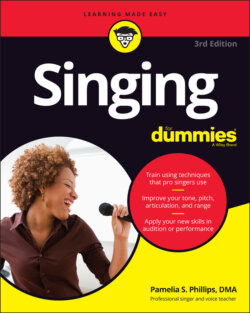Читать книгу Singing For Dummies - Pamelia S. Phillips - Страница 28
VOCAL SUBDIVISIONS
ОглавлениеIn classical music or the opera world, voice types can be further divided into categories based on the size and agility of the voice. The first four terms are in order like the soda sizes at the fast-food joint. Light is the small, lightweight cup, and dramatic is the cup so large that it won’t fit in the cup holder in your car.
Light: A bright, youthful, agile voice.
Lyric: A medium-sized voice with a warm color that’s comfortable singing long, even phrases. Lyric is appropriate for a romantic character.
Full: A louder, stronger voice that doesn’t necessarily sing fast lines as easily as a light voice.
Dramatic: A voice that’s even louder than a full voice and sings a heavier repertoire, such as Wagner. Dramatic voices can peel the paint off the wall from 50 paces. These voices are big and heavier than full lyric voices; they aren’t known for subtlety — they’re all about power and strength.
Coloratura: A flexible voice that moves easily through fast lines in the music.
A singer can be a mix of the terms in the preceding list. For example, a light lyric coloratura refers to a medium-sized light voice that moves easily. Seeing the words combined to describe a voice type isn’t so confusing if you understand the definition of each descriptive word. However, only in the classical world is it important for you to know how your voice fits within this list. Don’t worry about the specific kind of category you’re in until you get some training.
